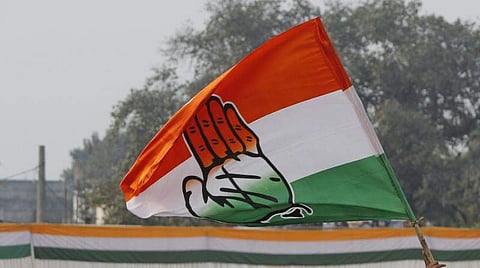

Continuing its fall in the Northeast, the Congress has become irrelevant in Tripura by completely alienating its support base. It’s reduced to being a party for name’s sake. A majority of voters do not even mention its name unless prodded. Upon being asked, they acknowledge its existence but merely as an entity that used to matter in the past. This has happened to a party that bagged 45% of the popular vote in the last Assembly election in 2013.
The grand old party has become irrelevant in Tripura by completely alienating its support base and has become a party just for name’s sake.
Our field work in the state suggests the Congress plight is due to three intrinsic factors and one extrinsic factor.
Deep apathy to support base
The first factor is the popular perception of the Congress as a discredited platform vis a vis its rivals. In Tripura where CPM has polarizing the people between pro-CPM and anti-CPM camps, the Congress until 2013 was the forum for the anti-CPM population. This was reflected in the 40% plus vote share that party has been bagging since 1988. This section that has been voting for the Congress since 1993 has been at the receiving end of harassment, systematic discrimination and violence. But the response of the state and national leadership of the party has been one of aloofness, taking the voters for granted. In response after response, voters related accounts of systematic targeting of anti-CPM people and the Congress’ indifference to its support base, leaving them at the mercy of their fate.
Need for Left support at national level
Although anti-CPM people rallied behind the Congress in election after election, the national leadership of the party ignored the ground realities in Tripura because it had to oblige the CPM at the national level. This allowed the CPM a free run in Tripura. The most glaring example of this suicidal attitude of the Congress national leadership was the instance when before the Assembly election in 1993, the then PM, P V Narsimha Rao, heeded to the request of the CPM to have the Assembly election under president’s rule rather than under the outgoing Congress government in the state, in exchange for Left’s support to his minority government.
No wonder, Congress tasted a humiliating defeat in that election and never came back to power in the state again. In fact, many anti-CPM respondents said CPM cadres used to take a dig at them by quipping that their leaders have an understanding with the national Congress leadership on Tripura. This created deep confusion and suspicion in the minds of Congress voters in Tripura. A middle-aged respondent at Sabroom in South Tripura district categorically stated that the BJP is a more credible anti-CPM platform.
Treating Tripura as marginal state
In the wake of fieldwork, it was claimed that the political mood of the state in this election is markedly different from the past elections. This was on account of the popular perception by majority of the respondents that Tripura has acquired an unprecedented centrality in the national political imagination, primarily on account of the massive investment of interest and effort of BJP’s national leadership in the state.
Here, even a common respondent would name Sunil Deodhar, BJP in-charge as the leader while mentioning Biplab Deb who was found to be quite a popular BJP leader among the anti-CPM electorates. It’s for the first time that a state in-charge who is from outside the state has acquired the image of a decisive leadership, installing confidence and acquiring popularity among the people. Now compare the same with any of the Congress state in-charge at present and in the past who would come to the poll bound state, stay at a hotel and treat their responsibility more as a routine work.
What differentiate Congress from BJP in terms of offering themselves as a credible anti-Left platform is the sheer lack of their passion about taking the Left in a passionate manner. This colossal mismatch between the hostile ground situation that in the past had put the Congress workers and supporters at receiving end, and the half-hearted, docile and politically malleable attitude of the national Congress leadership to their state leader and electorates has led to the withering away of the party in the present election.
BJP factor
It was quite clear that CPM has been winning the state continuously since 1993 not only on account of their massive political investments but also by the persistent failures of Congress to make the proportionate and passionate political investment. In his regard, it is noteworthy that BJP didn’t was not even a marginal force in the state until 2015.
It got merely 1.54% votes I the last election as compared to 45% of the Congress. In 2014 election also the Modi wave failed to reach the state and BJP could not get more that 5.7% of the votes. In fact, Left kept on registering the impressive electoral success at all levels which seriously dented the credentials of Congress as an fulcrum of anti-CPM space. Simultaneously, the national leadership of BJP started taking deep interest in the state and left no stone unturned to fill in the vacuum created by emergence of Congress as a discredited platform in the eyes of its support base.
The fieldwork has unambiguously revealed that entire Congress support base has shifted to BJP as overwhelming majority of the pro-BJP respondents identified themselves as having voted for the Congress in the last election. The data from the fieldwork categorically suggest that Congress vote share would not touch the 5% mark and most of its candidates would have to forfeit their deposit.
(Sajjan Kumar has a Ph.D from the Centre for Political Studies, JNU. He is associated with People’s Pulse, a Hyderabad-based research organisation specialising in field work-based electoral and political research.)